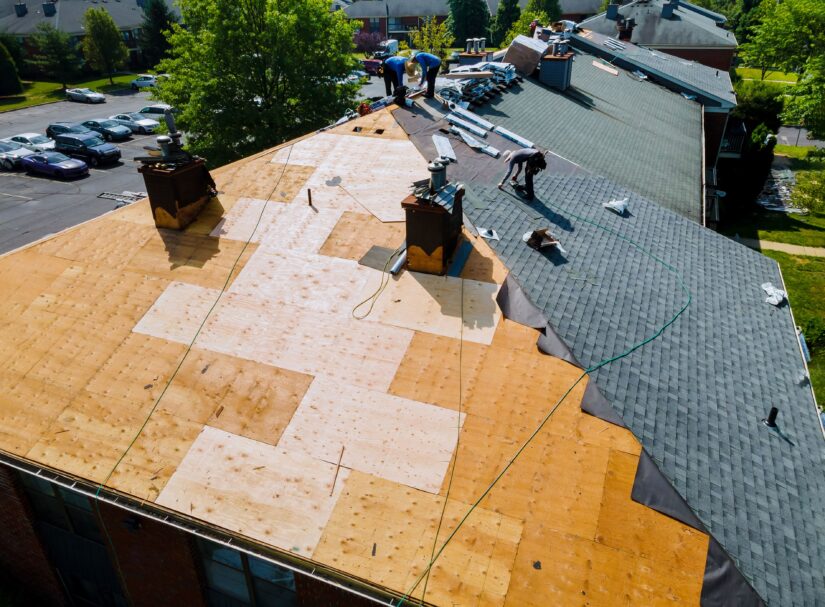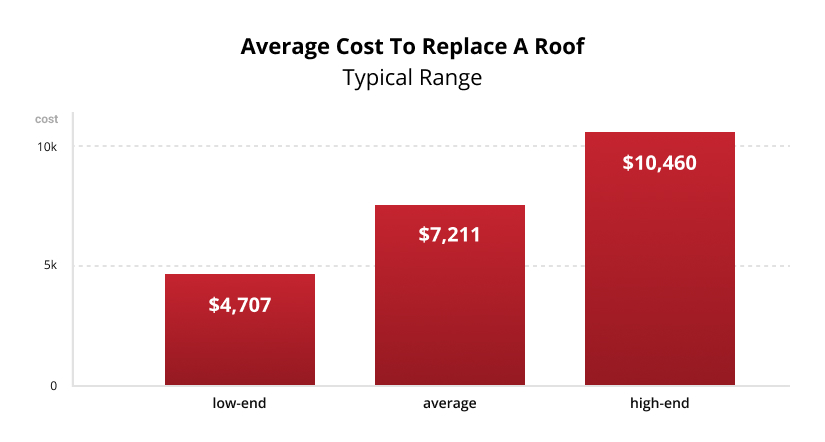Whether due to a natural disaster, severe weather, or ordinary wear and tear, your roof will eventually need to be replaced. A roof replacement is a big, complex job that should only be done by professionals. At Jackson Contracting, our professional roofing contractors will do the job quickly, efficiently, and thoroughly so that your home is safe, secure, and beautiful once again.
The amount of time the roof replacement process takes depends on a couple of factors, the size of the roof being the main one. The type of roofing material is the other. Asphalt roofs are the quickest, usually completed within a day. Metal roofs are usually completed in one or two days depending on the home, while roofing materials like wood shake or slate, can take up to a week.
No matter the type of roof, or the reason for its replacement, Indianapolis residents can trust the roofing contractors at Jackson Contracting to do the job in a timely manner and to their complete satisfaction. Call us today and let us stop by your property to give you a no-obligation estimate on your roof replacement process.

Steps to a Roof Replacement
Step 1: Choose the Right Contractor
Working with the right contractor is the first step in this step-by-step guide to roof replacement. The skill and experience of your contractor can affect the quality of your roof. With the right contractor, you will get a long-lasting roof that can handle the climate of Indianapolis.
A great contractor is someone who:
- Communicates clearly
- Is professional
- Is licensed and insured
- Has great reviews
Not working with the right contractor may mean that the final quality of the work is not up to par. The contractor may not understand all the laws regarding roof replacements or know about the latest processes. As a result, your roof might not be up to current standards.
Also, you could put your own home at risk. If a company does not carry worker’s compensation or liability insurance and an injury happens on your property, you could be responsible for paying for the injuries. You also may be responsible for paying for any damage that occurs during the roof replacement. Take no risks and call Jackson Contracting.
Step 2: Choose the Right Materials
Before the roof replacement can begin, you need to choose the right materials. Some are more appropriate for certain regions than others. It is important to choose a material that will work well in your climate and will also give you the right look for your home.
If you have a low pitch on your roof, you may be limited to certain materials. For example, wood shake shingles do not work well on low pitches. Our contractor will work with you to make sure you select the most appropriate material for your home and your budget.
Here are some popular roofing materials:
Asphalt Composition Shingles
Asphalt shingles are affordable and easy to find. They come in a variety of shapes and colors to complement your home’s architectural style. This makes them the preferred roofing option among today’s homeowners.
Wood Shakes
These shingles are attractive and tend to be very durable but they can be expensive and are not ideal for areas prone to fires. With an average annual rainfall of 42.4 inches, our city doesn’t typically have issues with wildfires.
Metal
Metal roofing has increased in popularity due to its durability and fireproof properties. You can find metal roofs that look like shingles as well as full sheets in a wide variety of metals and colors.
Yet, because contractors need to specialize in metal roofing installation, the cost tends to be higher but the durability of the material could make it cost-effective in the long run.
Slate
If you want a roof that is high-end and appealing, consider slate. It is one of the costliest options and is quite heavy. The repairs can also be costly and difficult, but the final look is like no other.
Composition Slate
For a more affordable slate-like alternative, consider composition slate. It is made with recyclable materials and looks like slate, but is lighter and less likely to experience damage.
Tile
Tile roofing can be made of clay or ceramic. Although it is most popular in Florida and California, you can find it anywhere. It is fire retardant, but it does put a significant amount of weight on your roof. You can find some alternatives to clay or ceramic that are lighter but just as visually appealing.

Step 3: Removing the Old Roof
The old shingles should be removed before the new roofing materials are laid down. In some cases, new roofing material can be placed over the old one. This is only possible when installing metal roofing over asphalt shingles and only if one layer of shingles is already on the roof.
The removal of the old roof is not only to make space for the new roof but also so that the roofing contractor can inspect the wood decking underneath. Although removing the old roof sounds like a simple task, it requires the right equipment and manpower.
At this stage, consider covering up your foliage with tarps since some of the materials of the old roof will fall to the ground. Also, place plywood against your windows and doors to prevent any damage.
We will only remove the old roof when the new materials are ready for installation. This can avoid unnecessary damage to the structure of your home if it were to be left open for days or weeks.
Step 4: Inspecting the Wood Decking
The decking provides a solid base for the roofing materials to be properly installed. If the roof needs to be replaced because of damage from severe weather or falling debris, then there is a chance that the decking will have sustained some damage as well.
The decking could also become soft or rotted due to moisture collection over the years. Your roofing contractor will perform a thorough inspection of the roof to make sure that the decking is in good condition for the new roof to be secure.
Step 5: Getting the Roof Surface Ready
There are some additional steps involved in preparing the roof surface for new shingles.
Drip Edge Installation – This is a piece of non-corrosive metal placed on the edges of the roof that prevents water from getting underneath and damaging the decking.
Underlayment Installation – The underlayment is a water-resistant or waterproof material placed between the wood decking and the roofing materials. It prevents the water from rain or melting ice from seeping into the wood decking and causing damage to the roof surface.
Step 6: Installing the New Roofing Materials
At this stage, the new roofing materials are finally installed onto the roof surface. The time of installation varies based on the type of roofing materials being used. More expensive materials like slate take longer to install because they can crack or break if they are stepped on, so the roofing contractor has to be more meticulous during the installation process.
Step 7: Cleanup and Final Inspection
Once the roofing materials have been installed, the crew will clean up any leftover debris from the installation to make sure that the house is clean for the homeowner. Your Indianapolis roofing contractor will then perform a detailed inspection of the newly installed roof to make sure that no mistakes were made and there are no flaws in the roofing material.
Once the contractor is satisfied that the new roof meets their standard of quality, the job is considered to be complete and you can be secure in the knowledge that you have a roof that will provide all the protection needed for a very long time.

Frequently Asked Questions Regarding Roof Replacement
Although knowing the steps to replace a roof can help you prepare for the process, you may still have some questions. Here are some common questions we hear from customers needing to replace a roof:
Is There a Right Season to Replace a Roof?
You might be wondering when you should schedule your roof replacement. However, there is no official time to schedule your work. You should get the job done as soon as possible.
This is due to the fact that postponing a roof replacement could cause more damage to your home. If you wait to replace it, you risk further water damage and other complications. The sooner you schedule your replacement, the better.
How Long Does the Process Take?
As with any home repair, there is no way to know for certain how long it will take to replace a roof. The timeline to replace a roof will depend on a variety of factors, including the material of the new roof, the type of roof, the roof installation process, and the experience of the crew.
When it comes to a new roof, typically, a wood shakes roof takes between three and four days. Synthetic slate could take slightly longer. A concrete tile roof takes about eight or nine days because of its heavy weight. A natural slate roof also takes longer than traditional materials. It usually takes about six or seven days.
Asphalt shingles are by far the simplest to install, and only take about one or two days for installation. But the size of your home will directly affect the time it takes for your roof to be replaced.
How Can Jackson Contracting Help?
Here at Jackson Contracting, we want to help you. From visiting your property and conducting a visual inspection of your roof, to recommending the right material for your new roof and giving you a no-obligation estimate, we will be with you every step of the way. We will always be just a phone call away to answer all your doubts or concerns. Contact us to get started on your roof replacement today.
